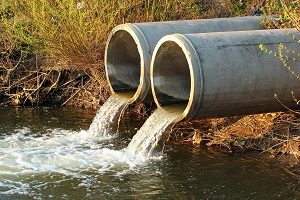Industry Trend: An Increase in Wastewater Pollution Claims
 Increasing awareness of environmental issues, more robust monitoring and detection methods, and evolving industry standards all contribute to an increase in wastewater pollution claims. Wastewater can spread disease, particularly from sewage treatment facilities, farm runoff, or contaminated wastewater from urban areas. The chemicals, parasites, bacteria, and viruses introduced to the water can cause health concerns for humans and the ecosystem. Even leaks of seemingly innocuous substances can threaten water bodies and wildlife when present in groundwater and streams.
Increasing awareness of environmental issues, more robust monitoring and detection methods, and evolving industry standards all contribute to an increase in wastewater pollution claims. Wastewater can spread disease, particularly from sewage treatment facilities, farm runoff, or contaminated wastewater from urban areas. The chemicals, parasites, bacteria, and viruses introduced to the water can cause health concerns for humans and the ecosystem. Even leaks of seemingly innocuous substances can threaten water bodies and wildlife when present in groundwater and streams.
Common causes of wastewater pollution include:
- Accidents causing wastewater to flood groundwater and storm sewers.
- Not adhering to regulations, resulting in the release of substances/wastewater in harmful amounts, in the wrong places.
- Equipment or infrastructure failures, either because systems are not maintained or because there are user errors.
- Extreme climate events like hurricanes or tornados causing flooding.
A few examples of business legal challenges related to wastewater include:
- Ellsworth Cooperative Creamery (ECC): In September of 2023, the Wisconsin Department of Justice (DOJ) accused the company of violations that impacted the water quality of Isabelle Creek, killing fish. ECC was required to pay a $250,000 penalty and install pollution control equipment.
- Dickson County Utility: Faced a water pollution lawsuit in 2023 from Harpeth Conservancy for sewage pollution seeping into a small stream that flows into the Harpeth River in Middle Tennessee. Tennessee state regulators, the Water Authority of Dickson County, and Harpeth Conservancy required the utility company to clean up the creek and make operational changes to protect the waterway in the future.
- Duke Energy: In 2015, the electrical power company was accused of allowing heavy metals and other contaminants from coal ash wastewater ponds to seep into the groundwater, endangering the environment and public health. Ultimately, they had to pay $68 million in fines and $34 million on environmental and land conversation projects to help area rivers and wetlands.
PartnerOne Premises Pollution is a Site-Specific Pollution policy offered through PartnerOne Environmental, providing coverage for both on-site and off-site clean-up, defense costs, and third party bodily injury and property damage claims.
Product enhancements for PartnerOne Premises Pollution (also called Environmental Impairment Liability – EIL) may include:
- Transportation Pollution Liability
- Contractors Pollution Liability (for Fixed-Base Operators)
- Natural Resource Damages
- Coverage for Aboveground and Underground Storage Tanks
- Business Interruption and Extra Expense
- Crisis Management Expense
- And more.
Wastewater pollution remains an important environmental concern across many industries, and businesses around the country are taking precautions to prevent losses. For more information on environmental coverage, please contact a PartnerOne Environmental team member today.
